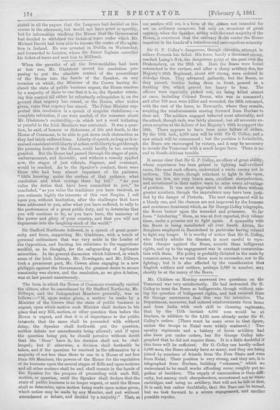The form in which the House of Commons eventually carried
the ciedure, after its amendment by Sir Stafford Northcote, Mr. Dillwyn, and the Independent Members generally, was as follows If, upon notice given, a motion be made. by a Minister of the Crown that the state of public business is urgent, upon which motion such Minister shall declare in his place that any Bill, motion, or other question then before the House is urgent, and that it is of importance to the public interests that the same shall be proceeded with without delay, the Speaker shall forthwith put the question, neither debate nor amendments being allowed ; and if upon the question being put, he should perceive without doubt that the ' Noes' have it, his decision shall not be chal- lenged; but if otherwise, a division shall forthwith be taken, and if the question be resolved in. the affirmative by a majority of not less than three to one in a House of not less than 300 Members, the powers of the House for the regulation of its business upon the several stages of Bills and upon motions and all other matters shall be and shall remain in the hands of the Speaker for the purpose of proceeding with such Bill, motion, or question, until the Speaker shall declare that the state of public business is no longer urgent, or until the House shall so determine, upon motion being made upon notice given, which notice may be made by any Member, and put without amendment or debate, and decided by a majority." That, as our readers will see, is a form of the c1,6fecre not intended for use on ordinary occasions, but only on occasions of great urgency, when the Speaker, acting with the vast majority of the House, is convinced that the ordinary Rules render the House impotent in the hands of a tenacious and unscrupulous minority


































 Previous page
Previous page